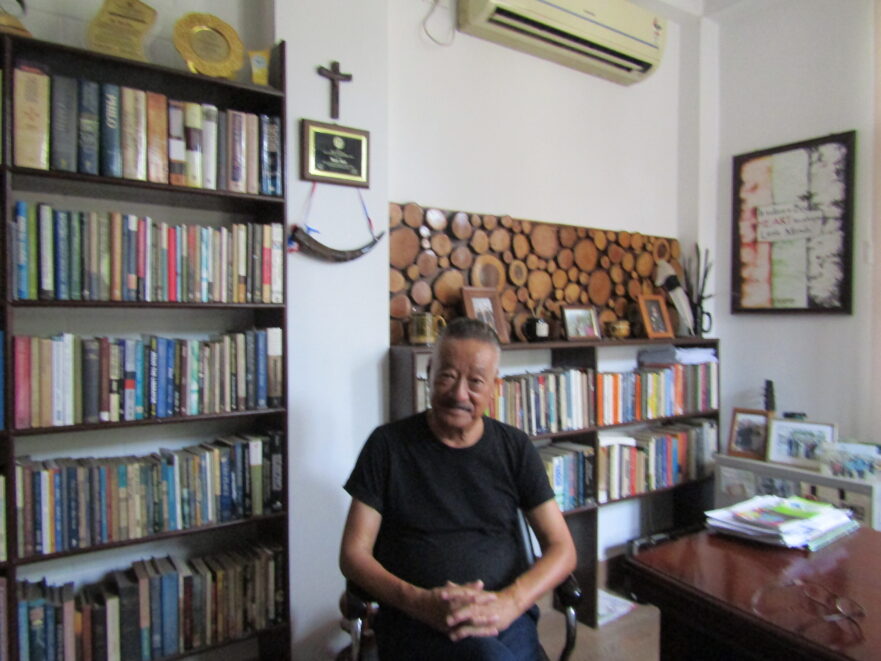Two years ago, 21Wilberforce entered into a strategic partnership with the Baptist World Alliance and one of the key goals was to develop a mobilization and support program to equip faith communities to engage in protecting religious freedom and defending the persecuted.
Central to this program are regional representative 21Wilberforce Ambassadors that work with churches, organizations and individuals to help identify and meet needs of churches and members facing religious restrictions or persecution.
Meet Asia Pacific Ambassador Rev. Dr. Wati Aier, a Naga theologian who is the former Principal of the Oriental Theological Seminary from the Nagaland Baptist Church Council in India, where he served for 26 years.
Dr. Aier convened the Council of the Naga Reconciliation, bringing together 3 Naga Warlords to sign the peace agreement. He currently serves as the Convenor of Forum for Naga Reconciliation (FNR). The FNR has initiated a movement called ‘Nagas Without Borders’ to bring Naga people in different Indian States and different countries together as one.
In 2011 Dr. Aier became the first recipient of the Baptist World Alliance Denton and Janice Lotz Human Rights Award in recognition for his tireless work to broker peace within the northeast Indian state of Nagaland. He currently serves as a member of the BWA Commission on Peace.
What follows is excerpted from a recent conversation with Dr. Aier about his lifelong passion for interfaith dialogue conflict resolution and peacebuilding.
Chongpongmeren Jamir has written that you were the first Naga theologian to “clearly expound the need for socio-political engagement of the church” in society. In your 1989 book, A Cry from the Rice Fields: A call of freedom for the Nagas, you wrote,
“The Church must witness with more than words. Through the life, service and sacrifice of their members, they must make their contribution to justice and peace, to the improvements of human conditions, and to the care of the needy and of the homeless. They must serve humbly the needs of the less developed peoples. In persecution and oppression, they can still witness to the spiritual freedom which their members enjoy.”
What progress has the Church in Nagaland, and in India, made addressing these issues you raised 34 years ago?
Dr. Aier: Time is in our favor. One can become impatient with things not accomplished forgetting that the process to socio-political engagement in the historical context of the biblical people takes intentional theological praxis and nurturing.
Today, the Church in Nagaland is coming to grips that Christians are in politics in so far as we live in political contexts. We are experiencing and learning that our lives are affected by political decisions and actions.
There is a growing realization among Naga Baptists that our faith can be fully effective in socio-cultural-politico front when the theology of the Church bears a faithful witness to the paradox of power in context. There is an ever-increasing sense of Christian community as an agent of change and transformation and this is what Baptist Christians in Nagaland are committing themselves to.
What insight would you share today, in 2023, for younger generations in Nagaland (and India) who might be grappling with how to reconcile their uniqueness and their faith beliefs with living in harmony?
Dr. Aier: Pluralism is a term used widely in today’s world. Pluralism as a political agenda is a welcome position in a world of multiethnic and diverse religious beliefs. Having said that, romancing pluralism as a theological agenda needs clarity. Religious faith differs from one to another. As such, Christian faith is different from Buddhism, Hinduism and Islam. Baptist Christians in Nagaland takes the uniqueness of Jesus Christ not only as a confession of Christian faith but as a commitment to flesh out in a given historical context where the followers of Christ are persecuted and sanctioned. This is especially true in mainland India. To be sure, Christian uniqueness must never be forced or coerced to anyone as much as lived.
Please comment on the difficulty of Christian living out their faith in Nagaland and all across India today.
Dr. Aier: Nagaland being predominantly Christian, there is no opposition from other religious groups. In India the Christian percentage is 2.3%. It is documented that the rise of Christian persecution in India is increasing in the form of physical attacks, burning of churches and Christian literatures, threats and intimidation. However, in Nagaland we have not experienced such persecution as of now.
You have agreed to serve as an Ambassador for 21Wilberforce in the Asia Pacific region. As a respected leader regarding conflict resolution, peace building and interfaith dialogue, what is your vision and/or hope for how 21Wilberforce can support your efforts and those of countless others, in the region?
Dr. Aier: In the global level, 21Wilberforce is a divinely mandated Christian “Body life” for this age. Personally, it is hoped that 21Wilberforce will promote and protect the rights of individuals and communities’ belonging of national, ethnic, religious and linguistic minorities—preventing assimilations and the loss of culture, religions and languages.

